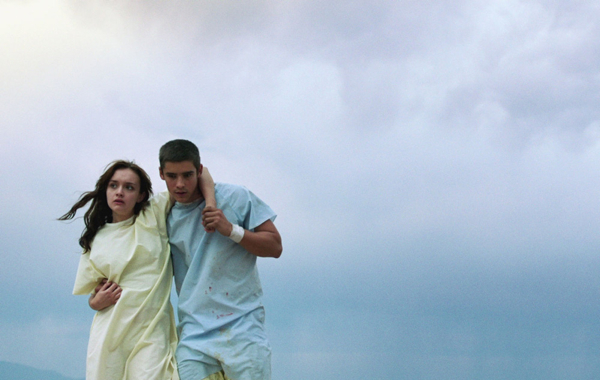Movie review by Greg Carlson
Every single penny of its modest budget up on the screen, William Eubank’s “The Signal” integrates impressive special effects in a manner similar to Josh Trank’s “Chronicle,” another out-of-the-blue science fiction thriller about a group of smart young people in over their heads. Unfortunately, “The Signal” lacks a great deal of the adrenalized rush found in “Chronicle” – despite its own high octane ambitions – and labors under the weight of too many frustrating hairpin turns in the careless script by Eubank, his brother Carlyle Eubank, and David Frigerio. Despite numerous promising stylistic flourishes and several moments of inspired visual design, “The Signal” takes itself too seriously. It’s the kind of movie that one imagines was way more fun to make than it is to watch.
Eubank begins well, effectively sketching the tensions of a westbound road trip taken by M.I.T. whiz kids Nic (Brenton Thwaites) and Jonah (Beau Knapp) on their way to deliver Nic’s girlfriend Haley (Olivia Cooke) to a university on the coast. Involved in an escalating online battle with a mysterious hacker who goes by the handle Nomad, Nic and Jonah make the dubious decision to use their computer skills to locate and confront their challenger. When the journey leads them to a creepy, seemingly abandoned shack in the middle of nowhere, most audience members will groan at the movie’s first major head-scratching leap of faith: why would a couple of ridiculously intelligent kids seek out a confrontation in the dead of night with an antagonistic creeper who has been taunting them with evidence of his surveillance powers?
It only gets worse from there, as the boys make the laughable decision to explore the structure’s basement while Haley remains by herself in the car. Sure. What happens next is a fleeting mash-up of “The Blair Witch Project” and “Signs,” followed by Nic waking up in a subterranean research facility/quarantine area where the calm but menacing Damon (Laurence Fishburne) interrogates the understandably freaked out young man. While the presence of Fishburne lends “The Signal” a strong dose of Morpheus cred, Eubank starts running in circles, working the paranoia and second-guessing to a frenzy without making up his mind whether or to what extent the viewer should buy the secret operation subterfuge.
Separated from a now comatose Haley, Nic discovers he can communicate with Jonah through a convenient air vent, just another of the movie’s endless red flags/red herrings/obvious tip-offs before revelation time. Outside the hazmat hospital, Eubank introduces a few divertissements, the best of which is an encounter with an Area 51 cuckoo played by the indispensable Lin Shaye and the worst of which is the tired fallback of a bullet-riddled, slow motion, machine gun showdown that makes zero sense once the big epiphanies are leaked during the movie’s final, optically dazzling movement.
Another unfortunate similarity “The Signal” shares with “Chronicle” is a blinkered point of view so male-centric that Cooke’s Haley is repeatedly silenced, shackled, and ignored. In a suspenseful attempted escape that is arguably the movie’s best scene, Haley lies unconscious on a gurney while Nic tries to wheel them out of the facility where they are held captive. The pattern loops: Haley doesn’t get to make any decisions; Haley doesn’t get to drive the getaway rig; Haley sits and waits while Nic takes action. It’s no shock that the real relationship of “The Signal” occurs in the bromance shared between Nic and Jonah. We’ve seen this before.
